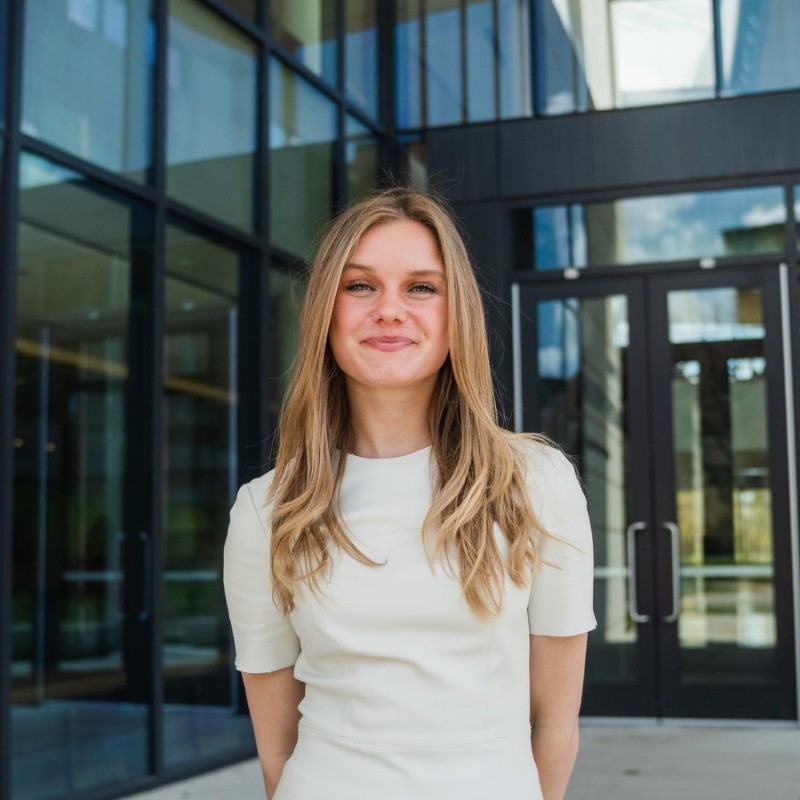
Standing in front of her open closet, Kaylin Goddard overflowed with anxiety. From end to end, the space was packed with crushing potential. What had once been one of the more mundane parts of her morning had turned into a hassle.
Inside were outfits too numerous to consider. New clothes—some still clinging to their price tags—mixed together with the well-worn staples of her wardrobe.
Goddard had a strong sense of style—matching complementary textures, patterns and colors. She knew that what you wear has a real impact. It affects how you perform throughout the day, how you feel about yourself and your confidence. Picking the right outfit was important and utterly overwhelming.
“I had a closet full of clothes, but it always seemed like I had nothing to wear,” Goddard said. “I would ultimately leave the house in something I didn’t feel comfortable in, or I would just re-wear the same things, causing a lot of my clothes to go to waste.”
It was the waste that stuck out.

Goddard was caught in a cycle—irrationally buying new clothes while paradoxically feeling like she never had anything to wear. And she wasn’t alone. Her friends reported the same unease, a similar trap.
From there, the idea for Attire was born—an app designed to optimize the process, allowing people to envision their clothes in uncommon ways by offering recommendations, customization and convenience.
For a long time, that’s all it was—an idea—a dream wedged into her imagination, pacing just outside the borders of obsession. From high school until her graduation from Michigan State, Goddard quietly tested the idea in her classes while mulling it through her mind, persistently pushing toward reality.
“It was eating me away,” she said. “I needed to do this. I needed to make it.”
Goddard’s graduation in May 2023 gave her the time and opportunity. But she needed direction.
The previous semester, Goddard’s advanced entrepreneurship course hosted a speaker from MSU’s Burgess Institute for Entrepreneurship and Innovation. Sean Fochtman, ’98, M.A. ’00, is the inaugural director of the Institute’s Alumni Venture Support Program. Goddard’s class was one of his first attempts to reach entrepreneurial-minded students.
“I needed people to lean on,” Goddard said. “I remembered Sean and reached out to him. I had no idea what Burgess offered, no idea what they could do. I was grasping at things, but I really needed a community.”
Leading By Example
Fochtman took a careful approach when he was hired by the Burgess Institute in November 2022 to lead the newly created Alumni Venture Support Program.
Before the program’s inception, alumni would reach out for entrepreneurial aid but find little. The staff did its best to help, but there was no dedicated structure to handle the requests.
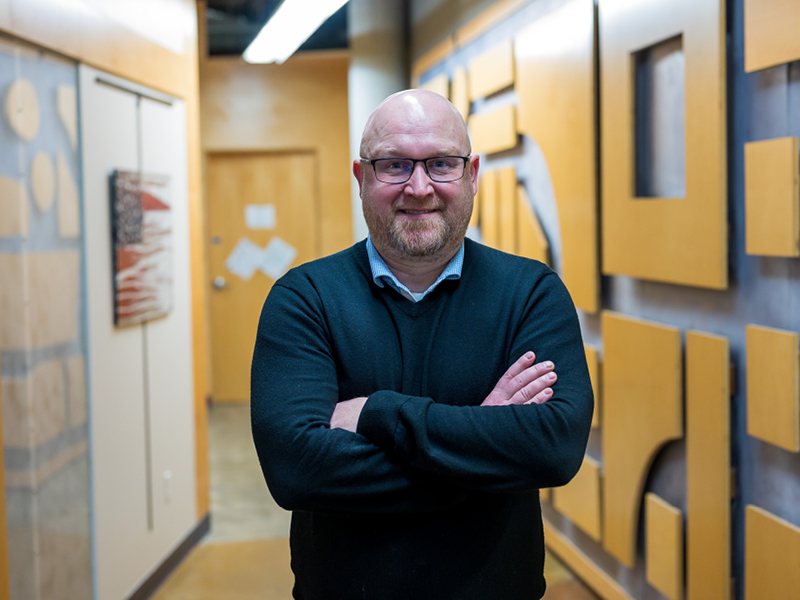
So, Fochtman spent the first year listening. Three concerns were raised most: alumni needed technical support, industry connections and funding. Those themes became the guiding principles at the program’s outset.
It also resonated with his own journey. Before joining Burgess, Fochtman was an academic advisor in the College of Engineering and the college’s contact with the Broad College of Business for student support in the entrepreneurship and innovation minor. More importantly, Fochtman was a business owner himself.
In 2015, Fochtman co-founded Brick Shield with Paul Jaques, Managing Director for Venture Creation at the Burgess Institute. Brick Shield produces a kid-safe, aerosol glue designed to preserve Lego creations, increasing the strength between the toy bricks by 50% while also being water-soluble for reuse. That experience guided his approach to his new role.
“I got lucky. I had the right connections by accident, but if you have a good idea and you’ve got something you’re passionate about and want to work on, you shouldn’t have to be lucky to move that idea forward,” Fochtman said. “I love I get to do that for other people now.”
At its most basic, the Alumni Venture Support Program is designed to provide resources and professional guidance to MSU alums with burgeoning startups whether they graduated yesterday or decades ago. The program aims to tap into the global Spartan network for valuable inspiration and support.
“It’s Spartans helping Spartans,” Fochtman said. “It doesn’t end the day you walk across the Breslin stage and get your diploma. We have over half a million living alumni. We can reach out to almost anybody in any industry. I haven’t had a no yet.”
Fashioning Futures
Throughout summer 2023, Fochtman and Goddard met to discuss Attire. That partnership continued after Goddard moved to North Carolina to pursue a career in financial technology consulting.
Fochtman was impressed with Goddard’s business acumen and assured her that she had a strong heading. Goddard graduated with high honors in finance and a minor in entrepreneurship and innovation. She possessed the skills required to start and operate a business, but building the app remained a roadblock.
Using Burgess’ connections, Fochtman introduced Goddard to Imagine Software, a student-run organization at MSU that offers its members practical experience working on real-world programming projects. By spring 2024, Goddard had the early stages of a working app. With a minimum viable product in place, she was able to present her idea in pitch competitions and secure early-seed funding.
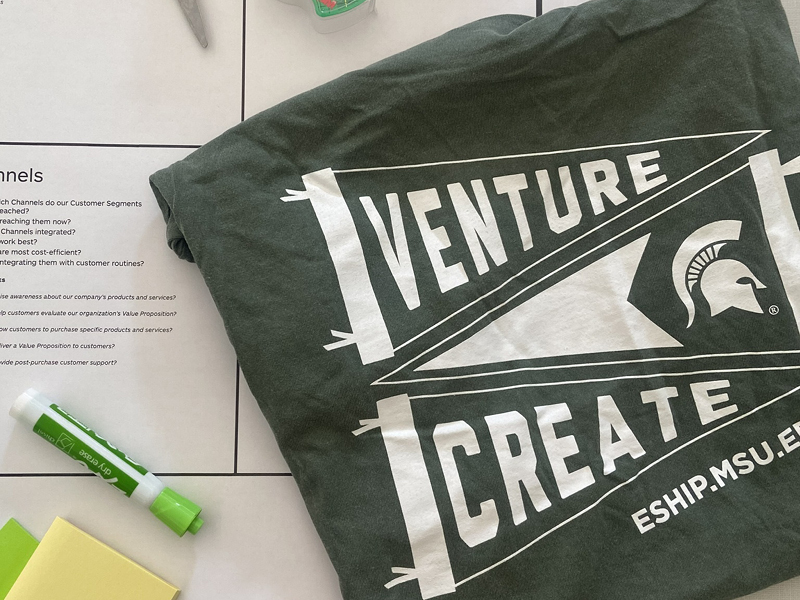
Two developers from Imagine Software have stayed on with Goddard. Dheeraj Thota and Nihar Bollareddy are currently students at MSU with full-time jobs working for Attire.
“They’re the force behind Attire’s technology,” Goddard said. “They’re creating some really cool things that have never been done before in the fashion space. It’s exciting.”
The material support provided by the program was equal in value for Goddard as Fochtman's mentorship. Despite envisaging her startup for years, moving from the ideation stage to the planning stage had been a terrifying step.
“It’s exciting because you know you’re building something that really matters, but you’re also jumping into the unknown,” Goddard said. “There’s a lot of fear taking that leap. It’s nice to know somebody is in your corner encouraging you because building a startup can be very lonely.”
That was a reality Goddard was prepared to face. Entrepreneurship students at MSU are treated to a comprehensive education in branding, networking, market research, finance, risk management and more. All of that is just half the equation, said Desireé Melfi Bozzo, faculty instructor for the Broad College of Business and former Director of Student Success & Advising at the Burgess Institute.
“The only thing stopping most people from starting a business is themselves,” Melfi Bozzo said. “We’re building an entrepreneurial mindset. It’s that idea of not being afraid to fail; of always making sure that your failures open the next door you need to go through.
“When people get stuck, it’s community that pulls you forward.”
Engineering Excellence
When Elliot Smith, MBA '24, walked into basement depths at the MSU College of Engineering building off Shaw Road, he wasn't sure what to expect. A year earlier, Smith had made a bold leap, leaving behind a comfortable career as a municipal engineer to chase an unknown.
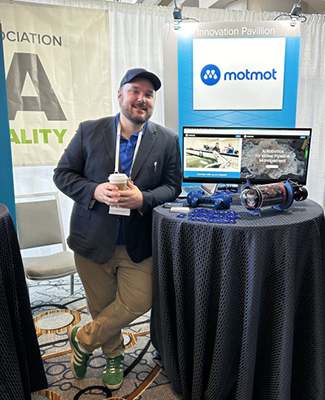
It wasn’t a change he had planned, but six years in the business taught him that most municipalities had very little understanding of their infrastructure. The system was too reactive—only when a water main broke or pipes started leaking would issues get addressed. Even advantaged communities were restricted by the prohibitive cost of proactive measures.
It was from that idea that Smith eventually co-founded Motmot, a cost-effective service that leverages robotics to inspect pipeline systems and collect critical data to identify issues early. To seriously pursue his idea, Smith enrolled in the MBA program at MSU.
“It was an idea that needed to be fleshed out in a lot of different ways,” he said. “I knew nothing about business and realized there were a lot of things I didn’t know that I probably should.”
Smith added a minor in entrepreneurship and innovation onto his graduate studies and worked closely with the Burgess Institute and the Venture Support Program.
In 2023, Fochtman introduced Smith to Dr. Xiaobo Tan, Associate Chair for Research in the College of Engineering. In Tan’s basement lab off Shaw Road, research in underwater robotics was already underway. Tan’s team included Dr. Demetris Coleman, who became Motmot’s co-founder and helped develop a prototype based on that research.
“Serendipity is the word,” Smith said. “I had this moment where I had their underwater robot in my hands, and it was everything I had been thinking about for the last several years but in the real. It was incredible.”
It was a moment that Smith doubts could have happened at many other universities where individual colleges are adversely siloed. "It’s very rare where anyone walks across the street to see what’s going on. So being able to cross-pollinate a civil engineering background to the business college and over to robotics, that’s where the magic starts to fly,” Smith said.
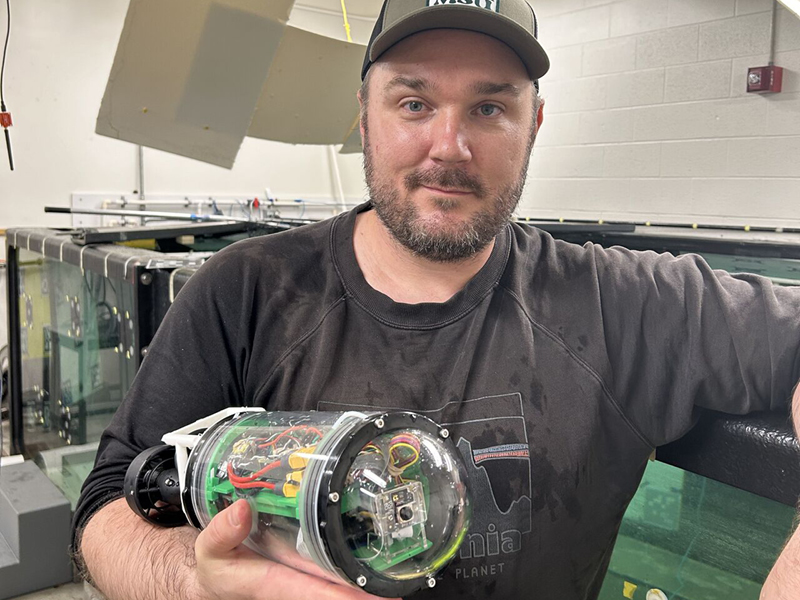
Motmot was the winner of the 2024 Burgess New Venture Challenge and was invited to the TechCrunch Startup Battlefield 200 after being named one of the world’s top tech startups.
The Alumni Venture Support Program provided Motmot with student interns through its Spartans for Startups Internship Program (Goddard and Attire will be part of the same program this summer). Fochtman also is working with university administrators and the city of East Lansing to help Motmot test its prototype in a live environment on—or under—campus.
“I don’t think you could find a better program than the Burgess Institute,” Smith said. “It felt like there was nothing off limits that you could ask for. They went above and beyond, both financially and using their relationships and partnerships. They would get you what you needed.”
Investing in Innovation
Around 2017, the Burgess Institute organized a student trip to California. A key stop was the Twitter headquarters where Jun Wang, M.A. ’04, served as the Senior Director of Software Engineering. He spoke to the students about his role at the tech giant and his experiences in the Silicon Valley startup scene. The trip soon became an annual tradition.
It also was revelatory for Wang who became more involved in his alma mater and discovered a gift for mentoring students and entrepreneurs looking for guidance. His journey in tech and startups and his passion for helping others made him a natural choice to join the Spartan Angel Network started earlier this year by Fochtman and Alumni Venture Support Program.
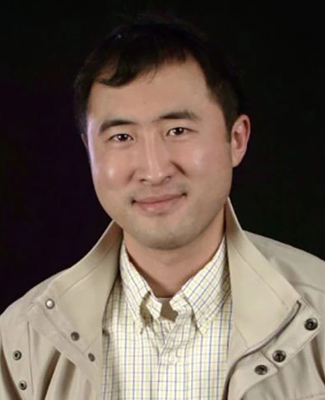
Wang understands what it’s like to stand at the edge of a promising venture, full of ideas but short on experience. Chasing the classic Silicon Valley story, Wang left a promising career at Google in 2012 on a two-year, high-risk detour. It was a rapid-learning environment that fueled a sense of purpose and excitement. At their best, startups can be an efficient environment where self-motivated people can thrive through problem solving and creative collaboration. But the room for error is dangerously small.
“The vast majority of time a company fails, it’s not because of lack of funding,” Wang said. “What’s missing in a lot of investor-founder relationships is guidance. Teaching founders how to be founders is the hole that I see in the ecosystem. I have a lot of personal reflections and lessons learned through firsthand experiences that make me a better partner to help entrepreneurs grow.”
Fochtman views Wang as the prototypical investor for the angel network. Potential angels need to be alums themselves—like Wang—or a friend of the university. Having a strong connection to MSU is as pivotal as the experiences they bring.
“This is supporting alumni on the other side, too,” Fochtman said. “They want to invest in companies that have those Spartan connections. It’s not something we necessarily envisioned when we started the program, but it makes sense. We’re supporting alums and helping make those connections.”
Wang, who still lives in the San Francisco Bay Area, sees Michigan as an untapped market often overlooked by investors seeking quick profits. By bringing lessons from Silicon Valley, Wang hopes to make a difference for Spartan entrepreneurs. That includes Smith and Motmot—one of Wang’s first investments.
“Spartans are a strong group of people that want to do great things,” Wang said. “It can be a very lonely journey for a lot of founders, and that’s particularly true in Michigan because it’s not as mainstream. But I feel they are actually more likely to succeed because you’re working against the odds. You need more conviction.”
Melfi Bozzo has witnessed the conviction of Spartans firsthand in the classroom and beyond. She knows the Alumni Venture Support Program is not only the service alumni need, but it’s one they deserve.
“It’s something we’ve never had before,” Melfi Bozzo said. “It’s knowing that somebody is there for you at your alma mater, the place you have so much love and affinity for, that’s willing to help you take a huge risk, and be there with support, conversation and time.”
Spartans are built to see what’s around the corner, to be prepared for what the next day is going to bring; an ability to be proactive and to live in a world of what’s possible.
“That’s a pretty incredible thing that sets us apart.”